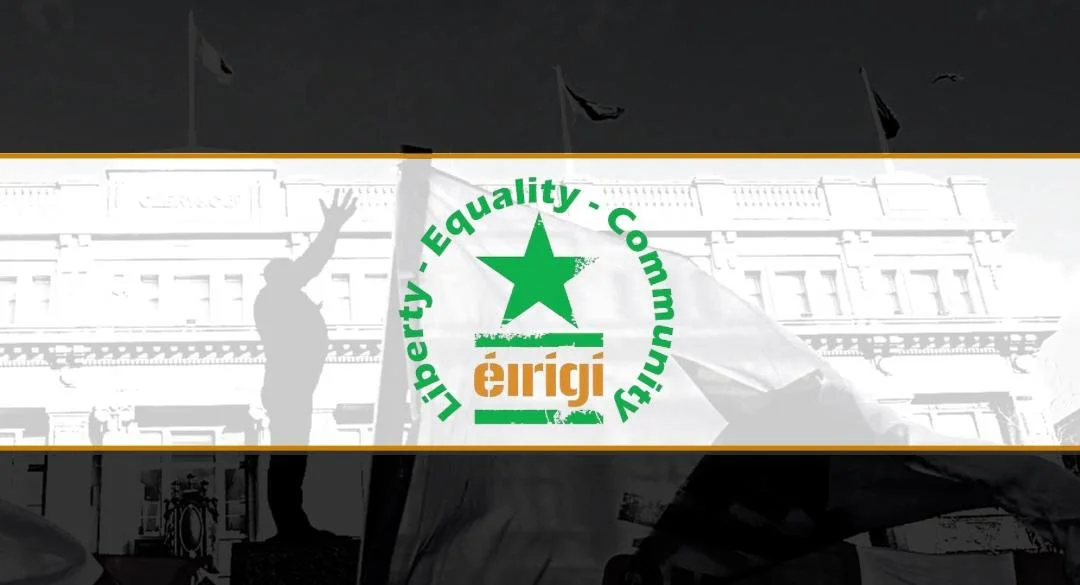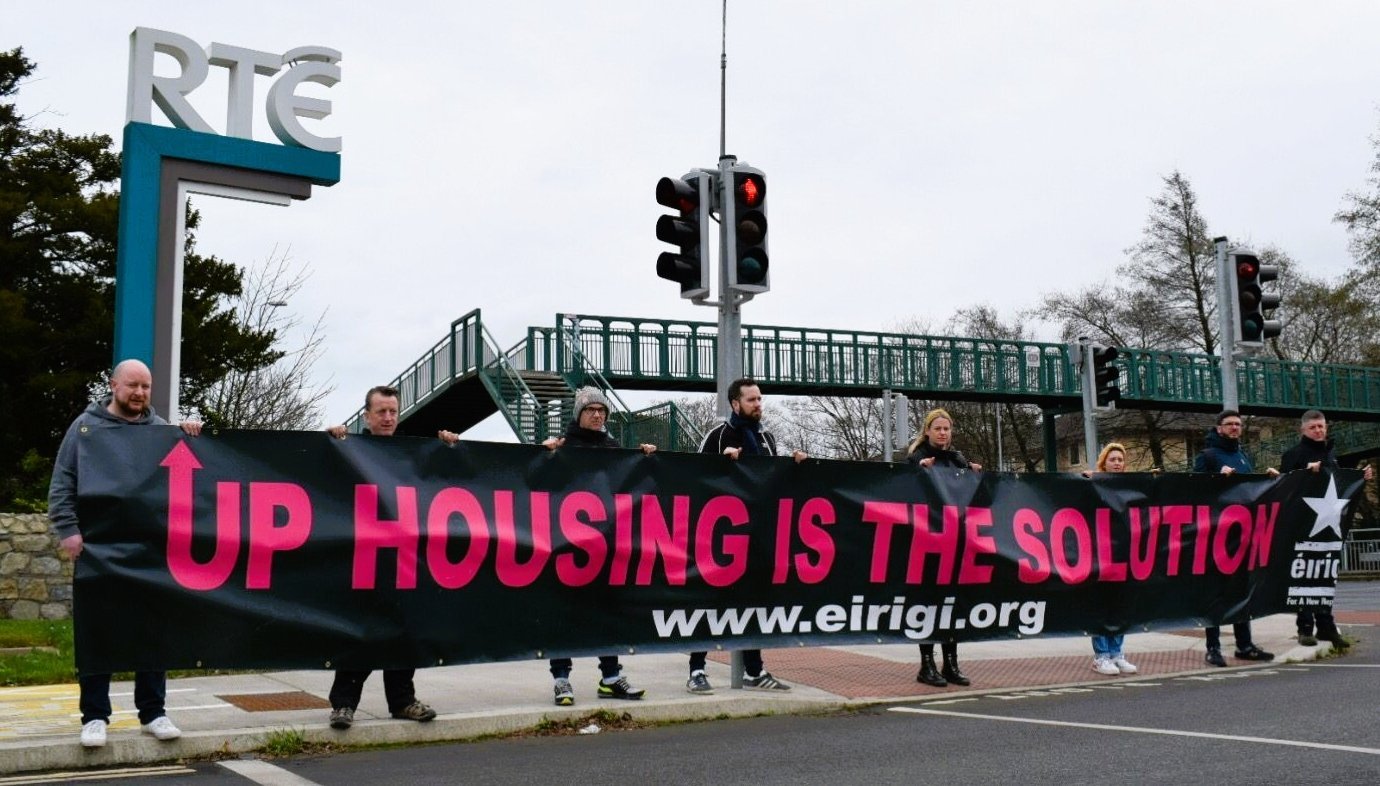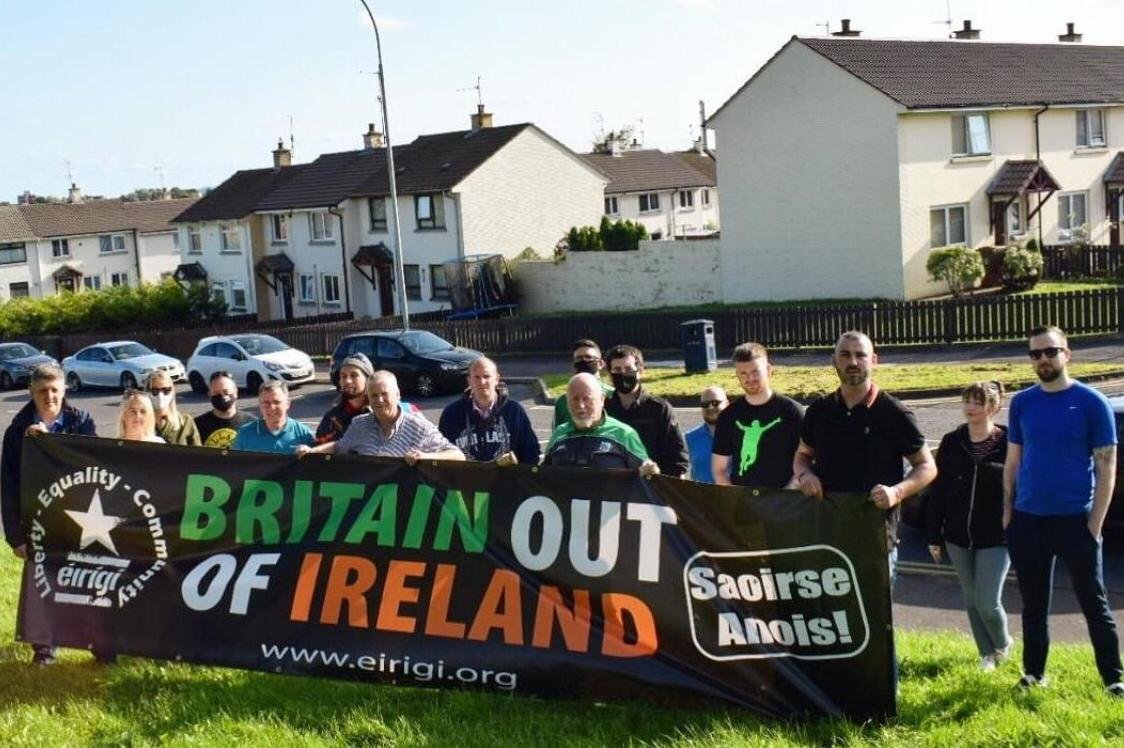Éirígí For A New Republic 2023 New Year Statement
As 2023 begins, Éirígí For A New Republic offers thanks to its members and supporters in Ireland and overseas for their contribution to the Irish republican struggle throughout 2022.
Through your activism you are advancing the cause of Liberty, Equality, Community, Justice and Democracy in Ireland. As this new year begins, take pride in the knowledge that you are acting in the same cause of generations of republicans stretching back to the time of Wolfe Tone.
2023 will mark the hundredth anniversary of the conclusion of the counter-revolutionary war that crushed the Irish Republic that had been declared at the outbreak of the 1916 Rising and democratically endorsed by An Chéad Dáil Éireann in 1919.
The military victory of counter-revolutionary forces in May 1923 copper-fastened partition and hastened the emergence of two conservative, sectarian, capitalist states in Ireland. James Connolly’s prediction that partition would result in a ‘carnival of reaction’ proved to be frighteningly prescient.
The Ireland of 2023 has been shaped by partition and the subsequent carnival of reaction which James Connolly prophesied.
From the outset, the economic, political and social design of both states placed the interests of bosses, bishops, bankers, landlords, gombeen politicians and the wider capitalist elite above the needs of the citizenship at large.
While much has changed in the century that has passed since 1923, the fundamental design of both states remains unchanged and incapable of change. Today, a century after their formation, the Twenty-Six and Six County states still place the interests of the few ahead of the needs of the many – a fact borne out by the current simultaneous crises in healthcare, housing, environmental protection, energy and many other areas of public life.
The early weeks of 2022 saw the lifting of virtually all Covid-related restrictions across Ireland, ending almost two years of unprecedented public health measures. Éirígí again extends heartfelt gratitude to all frontline workers for the roles that they played in overcoming the challenges presented by the emergence of this deadly new virus.
Despite the effective ending of the Covid health emergency, the Irish healthcare system remains in deep crisis on both sides of the border. Accident and Emergency departments are routinely overwhelmed, while more than 1.2 million people, including over 100,000 children, are now on waiting lists to access basic medical services.
This appalling scenario has not arisen because of Covid, but because of decades of ideologically driven mismanagement and underfunding of healthcare services by Leinster House, Stormont and Westminster.
Only the establishment of a new all-Ireland national health service can end the healthcare crisis – a publicly funded, single tier system that will deliver world class care on the basis of need, not wealth.
The impact of Covid was magnified by decades of chronic ideologically-motivated mismanagement and underfunding of health services. Only the creation of a properly-funded Irish NHS can deliver healthcare on the basis of need, not wealth.
The energy crisis that was triggered by Russia’s full-scale invasion of Ukraine has once again highlighted Ireland’s vulnerability to international energy shocks and Ireland’s chronic over-reliance on private Big Energy corporations.
The Dublin government’s response to that crisis has been to accelerate the giveaway of Ireland’s vast wind energy resources. Big Energy has already identified locations for offshore wind farms that could generate enough electricity to power a staggering 30 million homes by 2030 and a further 15 million homes post 2030.
These hugely ambitious plans are being advanced with little meaningful public debate or widespread public awareness of the long-term consequences of handing control of Ireland’s renewable energy sector to profit-driven Big Energy corporations.
Since 2006, Éirígí has consistently advocated and campaigned for Ireland’s energy resources to be held in public ownership and used in an environmentally sustainable manner for the collective good of the Irish people. In 2023, Éirígí will continue to build public awareness of, and public resistance to, the giveaway of Ireland’s wind energy resources through the Power To The People campaign.
Éirígí activists passing the historic GPO in Dublin. Bringing renewable energy into public ownership is the only way to guarantee energy security, energy independence and affordable energy.
The number of people being denied access to secure, affordable homes across Ireland continued to increase in 2022 as the housing crisis deepened further. The incalculable human, social and economic cost of the crisis is now being paid for by the people of no property in every village, town and city in Ireland.
The Fine Gael, Fianna Fáil and Green Party coalition remain fanatically committed to a housing model which places control of housing in the hands of land-hoarders, developers, bankers and landlords. Despite all the evidence to the contrary they continue to assert that the private sector and so-called market forces can deliver large volumes of secure affordable housing.
The housing policies of Sinn Féin, Labour, the Social Democrats and other opposition parties lack the ideological analysis, vision and ambition to break the stranglehold of the private forces that currently control housing in Ireland. As such, they are incapable of ending the housing crisis or delivering secure, affordable homes for our people.
In 2023 Éirígí activists will continue to campaign for the establishment of a new system of Universal Public Housing, understanding that only UP Housing can permanently end the housing crisis and transform Irish society for the better in the process.
Éirígí activists bringing the UP Housing message to RTÉ in Dublin. Only Universal Public Housing can permanently end the housing crisis while also transforming Irish society for the better.
2023 marks the 50th anniversary of the Sunningdale Agreement and the 25th anniversary of the Good Friday Agreement. While separated by a quarter of a century the political framework of these two political initiatives were broadly similar.
Both initiatives endorsed the Unionist Veto. Both sought to co-opt a section of Irish nationalism into administrating British rule in Ireland through a quasi-parliament in Stormont. Both included the creation of toothless all-Ireland political structures to provide a fig leaf of cover for participating nationalists. Both involved the transfer of limited powers to Stormont, but ultimate power, including the power to disestablish Stormont, was retained by Westminster.
The political establishments in Ireland and Britain were strongly supportive of the Sunningdale and Good Friday Agreements precisely because those initiatives presented no threat to the constitutional, economic or political status quo.
Today, Stormont remains in a state of suspension, as it has been for ten of the last twenty-five years. The much vaunted, but very limited, all-Ireland elements of the Good Friday Agreement have either stalled or regressed since 1998.
The notion that the institutions of the Good Friday Agreement offered a realistic route to Irish re-unification by 2016, as the Sinn Féin leadership asserted, has been proven to be nonsense.
Recognising the very real limits of the Good Friday Agreement does not equate to a call for a ‘return to war’, in the same way that recognising the futility of armed actions in 2023 does not equate to a call for support of the principles that underpin the Good Friday Agreement.
Éirígí has always rejected the notion that the strategic options open to Irish republicanism can be reduced to a binary choice between being either ‘pro-war’ or ‘pro-Good Friday Agreement’. Such simplistic, narrow thinking only serves the interests of the Irish and British political establishments.
Éirígí activists in Portadown, Co. Armagh. Ending the British occupation of the Six Counties is a prerequisite for meaningful change and the establishment of a New Republic.
Since 2006 Éirígí has consistently argued that positive social, political and economic change can only come through the building of a new peaceful mass movement that is made up of political parties, trade unions, cultural groups, women’s organisations, community groups and other progressive forces.
The key task facing Irish republicans in 2023 is the same as it has always been – to build widespread understanding of, and support for, the key tenets of Irish republicanism in the form of Liberty, Equality, Community, Justice and Democracy – to establish and develop republican organisations – to create a groundswell of popular support for the establishment of a new all-Ireland Republic.
There is no short cut to the New Republic. Convincing a critical mass of the Irish people to reject the status quo and to embrace the republican alternative will take patience, time and much work. Éirígí activists have already begun that work in communities across Ireland.
Éirígí’s Democratic Programme For The New Republic provides a detailed vision of a future Ireland that will reverse the carnival of reaction that has defined Ireland for the last century – a future Ireland based around a democratic economy and a fair society where all of our people will have access to healthcare, housing, education, energy, employment and those other things that are necessary for them to reach their full potential as citizens of the Irish Republic.
We encourage those who agree with the vision contained in A Democratic Programme For The New Republic to join the fight for radical change, to join the republican struggle, to join Éirígí.






